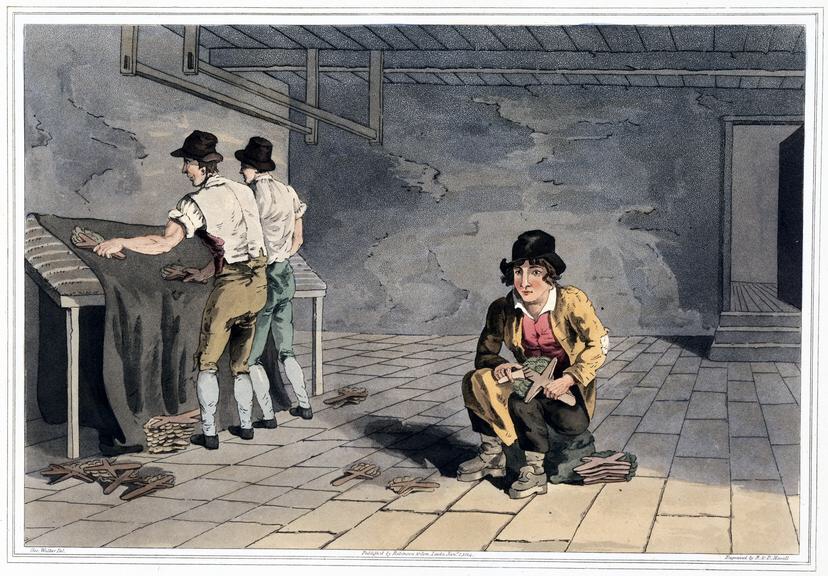From the archives, we can discover that Deaf and disabled mill workers were carrying out a range of roles in the textile industry, alongside other workers. Some of these jobs were the cause of many workers becoming disabled.
Many of the witnesses to the Sadler Committee of 1832, and the Factories Inquiry Commission the following year, told of the toll that strenuous work, carried out for long hours from a young age, had taken on their bodies. Their testimonies are remarkably similar as they speak about standing up all day, awkward reaching and twisting, and stopping moving machinery with their arms or knees.
In these inquiries, most of the witnesses had been piercers or pieceners, which was a common entry job for children during the first part of the 19th century. For example, the three Bainbridge brothers of Bradford, Charles, James and Thomas, all worked as piecers, but there were scores of others in this role. Piercers minded spinning machines to watch out for broken threads, which they would mend by twisting the ends together, without stopping the machinery. As well as being cheap labour, children’s small fingers were thought to be more nimble than adults.
Many of the witnesses said they tended or worked with Lewises. This was the name of an early version of power spinning machines.
Another job done by young children, generally boys, was that of premer or preemer, in the cloth finishing room. Teasels were used to raise the surface, or nap, of finished cloth, which was then shorn to give a soft, smooth finish. The teasels were fitted into metal frames on machines, but needed cleaning regularly as the spines clogged up with fibres. Cleaning the teasels was the job of premer boys. Alonzo Hargrave and David Bywater of Leeds were young premers.

David Bywater was later promoted from premer to cloth dresser (another name for cloth finisher) and cloth presser.
Often workers would move on to other jobs in the mill. Benjamin Gummersall of Bradford, John Dawson and William Hebden, both of Leeds, worked as doffers. They would remove bobbins from the spinning machines when full, and replace them with empty bobbins. John was also a bobbin hugger, or carrier, taking full bobbins of thread through to the weaving room, hard work for a young child. Over in Bradford, William Bradley and John Holmes called this job a bobbin ligger.
Some people stayed in the spinning room, but in the better job of spinning, where they might supervise piecers. John Hebergam of Huddersfield was a worsted spinner and James Carpenter of Leeds a flax spinner. Eliza Marshall was also a spinner and a drawer, grouping and drawing spun threads together.
A process nearer the beginning of yarn manufacture was carding, drawing the loose fibres over spiked drums of the scribbling machine to straighten them. William Kenworthy worked as a scribbler feeder and Elizabeth Bentley worked in the card-room, which she found easier than working in the weigh house.
Eldin Hargrave was a sweeper and errand boy, jobs which were often more suitable for disabled workers as they didn’t involve working with machines directly. Stephen Binns became an overlooker, although his health was still affected by the dusty mill work.
The former pupils of the Yorkshire Institution for the Deaf and Dumb worked in a wide range of jobs in the woollen, worsted, flax and silk industries in the mid 19th century. George Thompson of Leeds was a handle setter, putting teasel heads into the metal frames for the teasel gig, so he was perhaps a premer before that. Sarah Hartley was a bobbin winder in a south Leeds worsted mill along with her friend Jane Holmes. William Rayner was a cloth presser, George Daniel a Bradford woolcomber and Joseph Scott a pattern designer from Halifax. Other pupils became power-loom weavers, worsted hankers, burlers, wool sorters and pickers, doffers, spinners, fettlers, woolcombers and cloth dressers.
Disabled and Deaf workers were working in all parts of the Yorkshire textile industries.